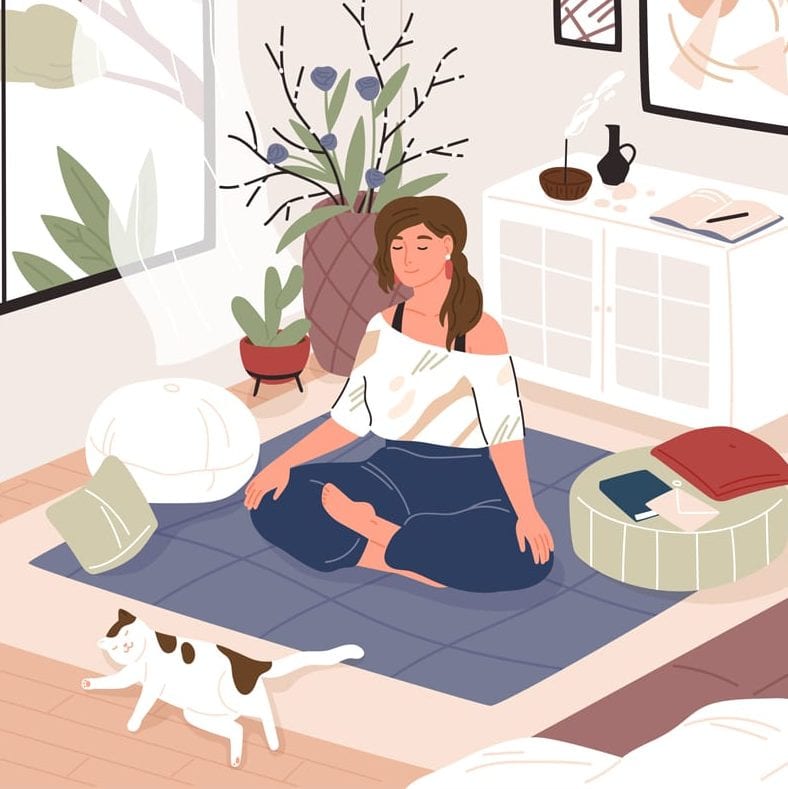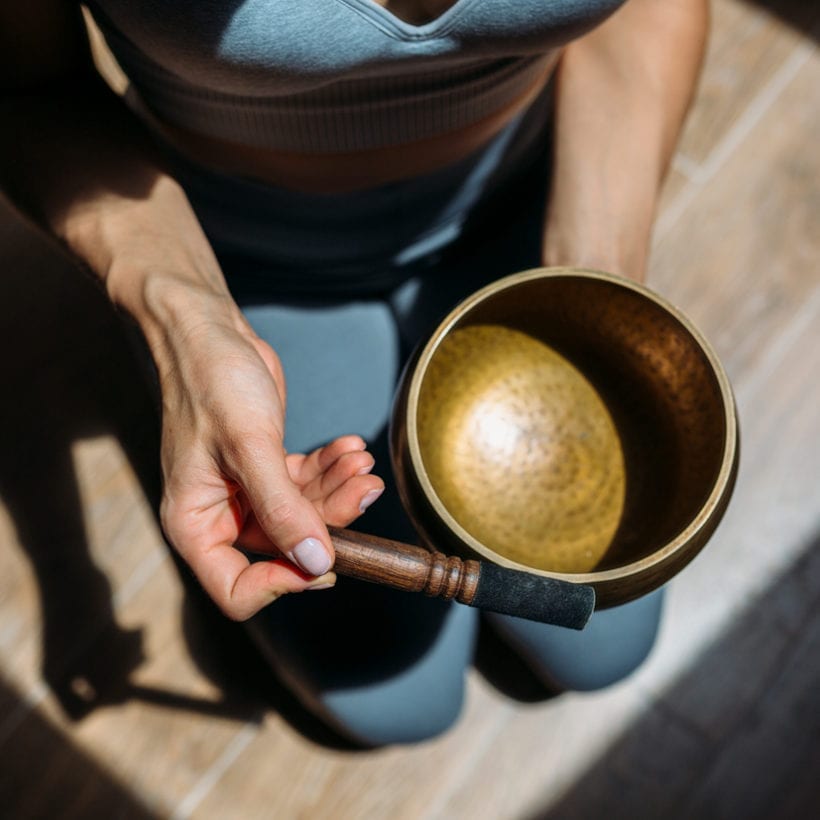I have spent a great deal of time staring at myself in the mirror during quarantine. Some days I am simply bored and other days I am blindsided by how unkempt I look without my regular beauty appointments. I keep telling myself that there are far more serious things to worry about amidst a pandemic than my physical image. However, as someone who has always struggled with disordered eating and body image issues, this time spent in isolation has been incredibly difficult.
The sad thing is I really thought I had a handle on everything, but what I have learned is that I only knew how to cope when life was going exactly as planned. An orderly life complete with a fancy gym membership, desk salads and monthly therapy. Control, or the lack of it, is often the root cause of many people’s toxic relationship with food and these unprecedented times have shown us how little power we have over our lives. I often wonder if I am spending all this time fixating on my physical appearance because it is the only thing within my control right now. We are putting so much unnecessary stress on ourselves to look, feel and act a certain way and, most of the time, it has little to do with other people.
 As the world spins around me, my stress levels continue to rise with no end in sight. While we know that stress is bad for us, stress also plays a significant role in how our bodies respond to food. “When we are experiencing stress, our bodies simply do not digest and absorb food and nutrients as well as they should,” says Elissa Goodman, holistic nutritionist and lifestyle cleanse expert. So, all this time fixating on what I am eating, only to fall victim to a silent predator. Many of us have also turned to overeating as a way to cope with mind-numbing boredom or to provide ourselves some much-needed comfort. “When cortisol levels are increased, our happy hormones, such as dopamine and serotonin, are decreased. Food boosts those happy hormones and many people tend to crave fat and sugar, which are ideal comfort foods, in order to get ‘happy’ again during these times of stress. The brain wants a reward and once it associates food with increasing the happy hormones, we fall into a pattern of using food as a coping mechanism for stress,” says Sarah Koszyk, MA, RDN, Registered Dietitian and Sports Nutritionist, co-Founder of MIJA and co-author of Brain Food: 10 Simple Foods That Will Increase Your Focus, Improve Your Memory and Decrease Depression. While adapting to this time period has been challenging, educating yourself on what triggers you and how to cope properly can be a key first step in the path to recovery.
As the world spins around me, my stress levels continue to rise with no end in sight. While we know that stress is bad for us, stress also plays a significant role in how our bodies respond to food. “When we are experiencing stress, our bodies simply do not digest and absorb food and nutrients as well as they should,” says Elissa Goodman, holistic nutritionist and lifestyle cleanse expert. So, all this time fixating on what I am eating, only to fall victim to a silent predator. Many of us have also turned to overeating as a way to cope with mind-numbing boredom or to provide ourselves some much-needed comfort. “When cortisol levels are increased, our happy hormones, such as dopamine and serotonin, are decreased. Food boosts those happy hormones and many people tend to crave fat and sugar, which are ideal comfort foods, in order to get ‘happy’ again during these times of stress. The brain wants a reward and once it associates food with increasing the happy hormones, we fall into a pattern of using food as a coping mechanism for stress,” says Sarah Koszyk, MA, RDN, Registered Dietitian and Sports Nutritionist, co-Founder of MIJA and co-author of Brain Food: 10 Simple Foods That Will Increase Your Focus, Improve Your Memory and Decrease Depression. While adapting to this time period has been challenging, educating yourself on what triggers you and how to cope properly can be a key first step in the path to recovery.
How does stress affect my body when it comes to food?
Elissa Goodman: You can think about it like this: the autonomic nervous system (ANS) is divided into subsystems called the parasympathetic and sympathetic nervous systems. The parasympathetic nervous system (PNS) is often described as the “rest and digest” system. When we are calm, our brains allow our bodies to undergo typical processes such as food digestion. Our sympathetic nervous system (SNS) is regularly described as the “fight or flight system” because it is the system that is activated when a stressful event occurs. When the SNS is activated, normal bodily functions such as digestion cease, and more resources are dedicated to parts of our bodies necessary for escaping a potentially dangerous threat such as our legs and our lungs.
I often wonder if I am spending all this time fixating on my physical appearance because it is the only thing within my control right now.
How do terms like “COVID-19” help to damage the psyche?
Sarah Koszyk: Words do have power. It’s important to note that there is a possibility of weight change whenever our lives are altered from our normal routine. For example, many people experience weight changes when going to college for the first time because they’re in a new environment that they need to adjust to in order to maintain their desired health routines. The same thing goes with COVID and shelter in place. People’s lives have been drastically modified so they need to adjust for the changes. A new fitness and food routine most likely will be necessary to accommodate this unique situation. In addition, many people aren’t moving around as much because they’re stuck inside and they’re not commuting. With the reduced activity, there may need to be a reduction in food intake since their bodies don’t need as much fuel. Or people may be eating more because the food from their kitchen is so readily available and easy to access. There are a lot of factors that can result in weight changes during this time. And it’s important to note and be aware of what can affect us.
If someone is struggling with an eating disorder this may be an especially challenging time. Any advice?
EG: This time is especially challenging for anyone with disorders and addictions of any kind. With heightened stress always comes other challenges. I encourage anyone with an eating disorder to seek help and know that even if they are practicing physical distancing, they are not alone. There are virtual resources available to those who do not wish to get help in-person.
How do I comfort myself without turning to comfort foods?
EG: Exercise may seem like the last thing you want to do when you are feeling anxious, but it can do wonders to reduce stress levels. I also do not believe that everyone needs to repel the idea of comfort foods. Obviously, relying on foods for comfort can be a slippery slope. When I was working in a crazy stressful job before I was diagnosed with cancer in my 30s, I would come home at night and console myself by eating nutrient-lacking snacks like fried potato chips. However, these days I still use certain foods as a mechanism of comfort in moderation. For example, when I am feeling anxious, I love to have a warm bowl of green veggie soup or a turmeric latte to ground me. The difference is that now I am aware of what is happening and am choosing to comfort myself with healthful foods in a limited capacity.
SK: The first goal is to control physical hunger.
- Stay fueled. If someone is actually hungry and stressed out, making conscious efforts to eat “healthy” and not stress eat is really challenging. Eat your regular meals and snacks.
- Set a timer in your calendar to remind you to eat at specific times when you would normally eat the meal/snack. You can also pre-plan your snacks and prep them so that when it is snack time, you have your desired snack to eat instead of going for other options or consuming bigger portions than necessary.
- If you notice a desire to eat outside of these structured times like when you are bored, stressed, or anxious, then you can start to focus on being mindful.
- Distance yourself from the foods that trigger you or just don’t buy them for the house. Or if you have those undesirable, tempting foods in the home for other family members, try delaying the consumption of them when you’ve stressed out so the reward system isn’t as rapid and the body will reduce the feelings associated with that food as a perceived stress-reliever.
How do we keep ourselves from eating because we are bored/restless/worried?
EG: I always tell my clients that it is about being present. We need to practice being in the here and now so that we do not get sucked into mindless or emotional eating out of boredom or stress. Instead, we can recognize our circumstances and act accordingly. A few of my favorite methods to stay present and avoid stress/boredom eating are yoga, meditation, daily gratitude practice, breathwork, and reiki.
 SK: The trick is to find an alternative comforting routine instead of eating the comfort foods. This varies per person and should be customized for what each individual enjoys doing. Non-food-related rewards include exercising, reading, watching TV, listening to music, doing arts and crafts, knitting, taking a warm bath with candles, going for a walk or calling a friend. The more the new routine is practiced, the easier it becomes and the brain will associate that new practice as the reward.
SK: The trick is to find an alternative comforting routine instead of eating the comfort foods. This varies per person and should be customized for what each individual enjoys doing. Non-food-related rewards include exercising, reading, watching TV, listening to music, doing arts and crafts, knitting, taking a warm bath with candles, going for a walk or calling a friend. The more the new routine is practiced, the easier it becomes and the brain will associate that new practice as the reward.
How do I avoid thinking about quarantine as a time to “work on myself” i.e. my body? To not look at this as more time to control my diet or get extra workouts in?
EG: This is something that I have struggled with personally. I am a perfectionist to my core and am addicted to progress. Every day in isolation I have had to actively tell myself to ease up on my expectations for myself. Sometimes not doing something can require just as much effort as doing something. I have made a concerted effort to dedicate portions of my day to doing nothing, meditating and just being rather than feeling like I always have to be productive.
When there are so many “bigger issues” going on how to stay away from feeling guilty over the amount of mental energy spent worrying about our body issues?
EG: For me and so many of my clients, it always comes back to the snowball effect. When I am stressed about one thing, my overactive monkey mind likes to take control and point out all of the other things that I should be concerned about. When I find myself going down that path, I take a few moments to breathe and get centered rather than allowing my anxious thoughts to take over. One of my favorite strategies to avoid self-guilting is talking to ourselves as if we are speaking to our best friend. And I am being literal here. Recognize when you are talking down to yourself and, instead, audibly respond in the way that you would if you were talking to your closest friend. If your best friend said something like, “There are so many pressing issues transpiring around the world today; I am being completely self-absorbed by focusing on my insignificant body issues,” you would likely have a more compassionate response than if you were mentally responding to yourself. It all starts with how we speak to ourselves internally.
What are some helpful tools to practice self-acceptance?
SK: Take a moment and embrace the negative thoughts. Understand that you feel the way you feel and take note of it. Once you can accept your feelings, it’s easier to work on them and move forward. Try practicing self-gratitude daily. Write down 3 positive things about yourself such as “I like my hair.” “I’m a kind person.” Look in the mirror and say each statement out loud five times. The more positive talk we share with ourselves, the easier it becomes to believe in its truth.
 EG: In addition to yoga, meditation, reiki and gratitude practice, I recommend beginning each day with a positive affirmation such as “I am enough, I am worthy of love, I love myself.” The psychological theory states that if you practice the same positive mantra enough, it can have lasting effects on the way you think and feel.
EG: In addition to yoga, meditation, reiki and gratitude practice, I recommend beginning each day with a positive affirmation such as “I am enough, I am worthy of love, I love myself.” The psychological theory states that if you practice the same positive mantra enough, it can have lasting effects on the way you think and feel.
We only recommend products we have independently researched, tested, and loved. If you purchase a product found through our links, Sunday Edit may earn an affiliate commission.







